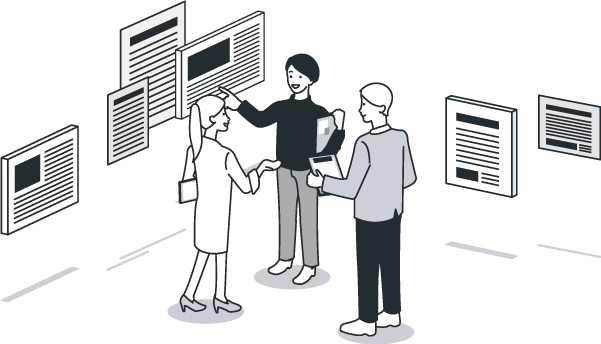
ニュース news
【ENGLISH】Social Challenger Award
Support Your Club with Sign Language Day (Omiya Ardijya)
■Social Challenger Award
The Importance of Continuation - Story of Omiya Ardijya -
The “Support your club with Sign Language Day” which Omiya Ardijya entered as a project that is led by the Sign Language Support Activation Committee. It began in 2006 and although there were years discontinued, there have been 11 times when the day was conducted at the stadium. The selection committee praised the continuity of this project.
Upon entry the club had other activities that could’ve been candidates, but without much discussion they ended up nominating the “Support your team with sign language day”. It may be one thing to start something new, but the emphasis was put on the importance of the continuity of one project.
Before it ended up in the committee’s hands, this project easily received the most public votes. The number of people involved, and the fact that it seemed open to non-supporters, fans, and even non-sports fans were the reason. These factors can be how it spreads to normalization. It’s great to see the project itself develop, but we feel the part of this section was many people’s hope in this spreading nationwide.
Interviewee for the article includes, president Ryo Tabei and chairman Nozomu Otokozawa from Mainichi Kogyo. Also will be Masato Ikeda, partnership sales representative and hometown promotion group personnel Gen Itatani from Omiya Ardijya.
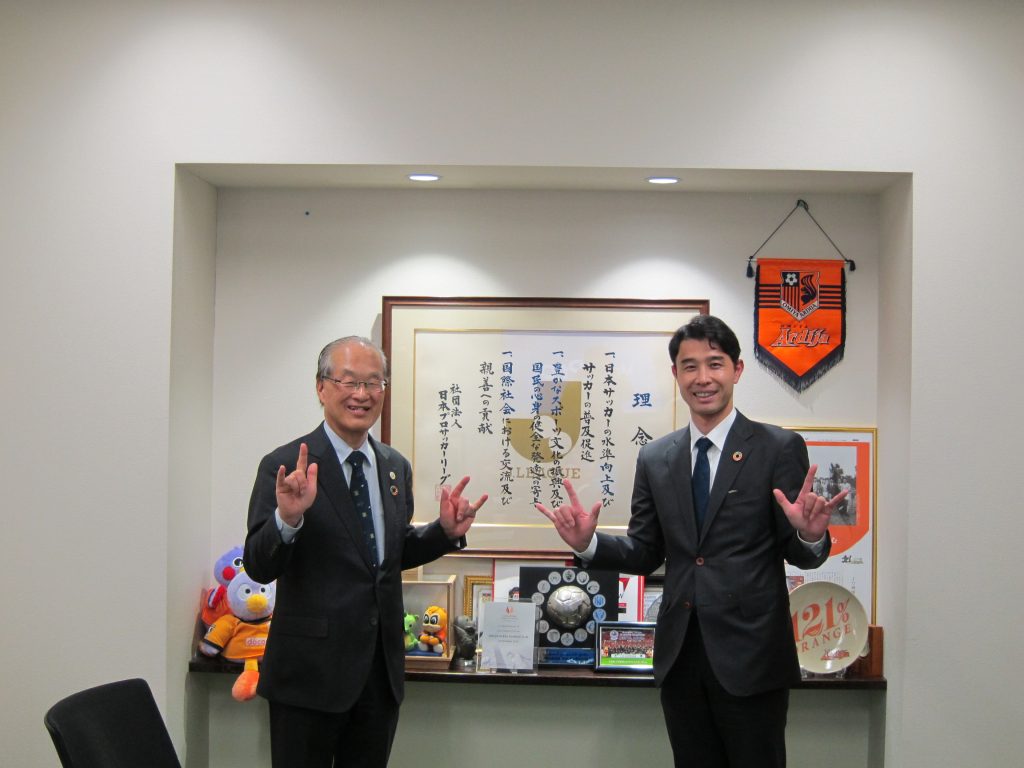
The project started from the relationship with passed Mainichi Kogyo founder, Isao Tabei (Father of interviewee Ryo Tabei) and Special Olympics Honoring Chairman of Japan, Kayoko Hosokawa. Previously, Isao was asked to conduct the Special Olympics torch run in Saitama and was able to succeed in doing that. This project was brought up to continue that momentum. The collaboration with the club has begun by providing seats for disabilities and then led to this “Support your team with Sign Language Day” project.
The relationship with the predecessor and Hosokawa started from a screening event of a human documentary called “able” which was a story about two youth dealing with mental disability. The executive producer of this documentary was Hosokawa. The relationship began when Mainichi Kogyo asked whether if they can show the documentary to their employees. This story deeply shows the predecessor’s way of life and the culture he was creating at his company which makes us think twice of our own selves.
【Reference】About the documentary ”able”
As this is a project that has continued for a number of years, it must have a significant meaning to people involved. You could tell what this project means for Omiya Ardijya as a club with the following comments from Ikeda.
“Our club is one of the members involved and we work together with the executive committee which taking the lead. When I first heard about the award, their faces came up and brought me a fresh feeling.”
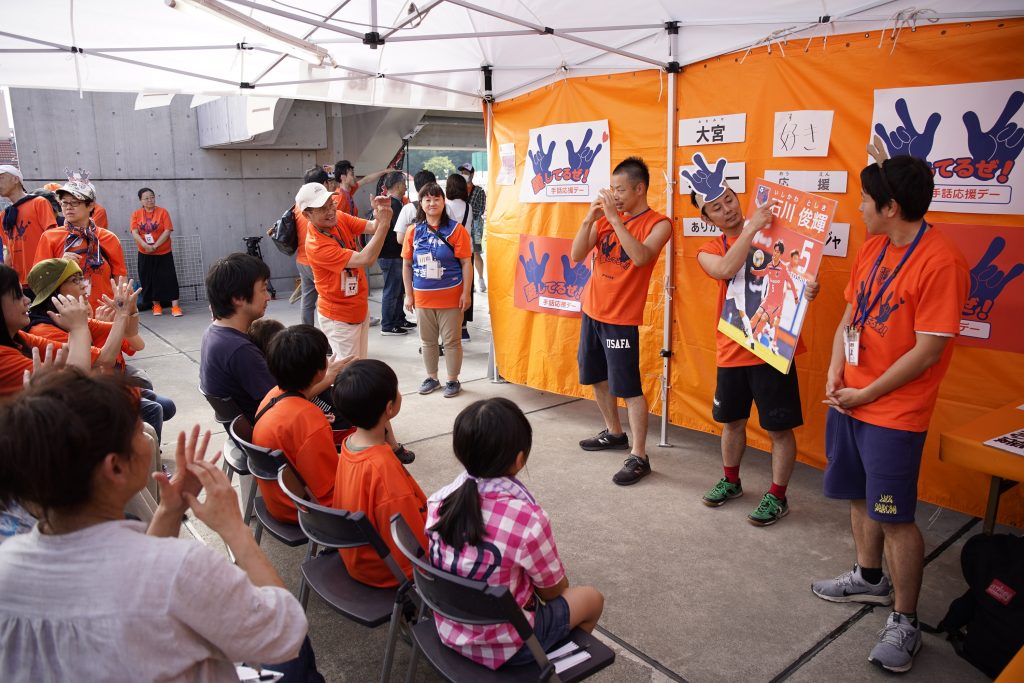
“To be honest, we wanted Ms. Chieko Eto, of the Omiya Rou Gakuen(Deaf School)and the members of the executive committee to join this interview, but unfortunately in our current situation we were not able to get together. That’s why we asked that Ryo Tabei and Nozomu Otokozawa to represent as the they act as the executive committee office.”
When J League launched the SHAREN project the intent was to change the noun. If the league were to lead this project, it has the danger of becoming a selfish project with limited members being involved. With only limited number of people involved, the number of smiles we are able to deliver may also be limited. In order to avoid that, the league chose the word, “Utilize the J League” to deliver the message.
I think we are a club that has been implementing that way of thinking before the SHAREN project has launched. Involve people and do it together. The activity and people will grow by doing it that way. It’s the accumulation of it.
If the objective of the SHAREN award is to deliver the appreciation to the people you worked together with and provide the spotlight on them, I hope that becomes what we get from this and hopefully we see that by taking part in this interview hoping which would eventually lead to reaching more individual.
*******************
Connecting the Dots
―What’s your reaction after hearing about the award? Any memories that comes up to mind?
(Mainichi:Tabei)We are happy to see the work that was continuously conducted with the collaboration by the members of the executive committee, government, supporters, corporations, organizations and the club were rewarded. It’s rewarding to know that the acceptance of this award has led to more people knowing about the ‘Support your club with sign language day” and the project that has brought all participating members, disabled or not together. Couple years ago, we received one letter from a supporter from the visiting club. In the letter, it mentioned about a daughter who has a hearing disability that was forced to go to the stadium and was unhappy at first, but ended up thanking her father on the way home as it happened to be the “Support your club with sign language day.”. As this letter was shared to me by the club, I had a feeling that the dots connected. It was a really special feeling that our project was reaching even to the hearts of the people that actually came as a fan for the visiting club.
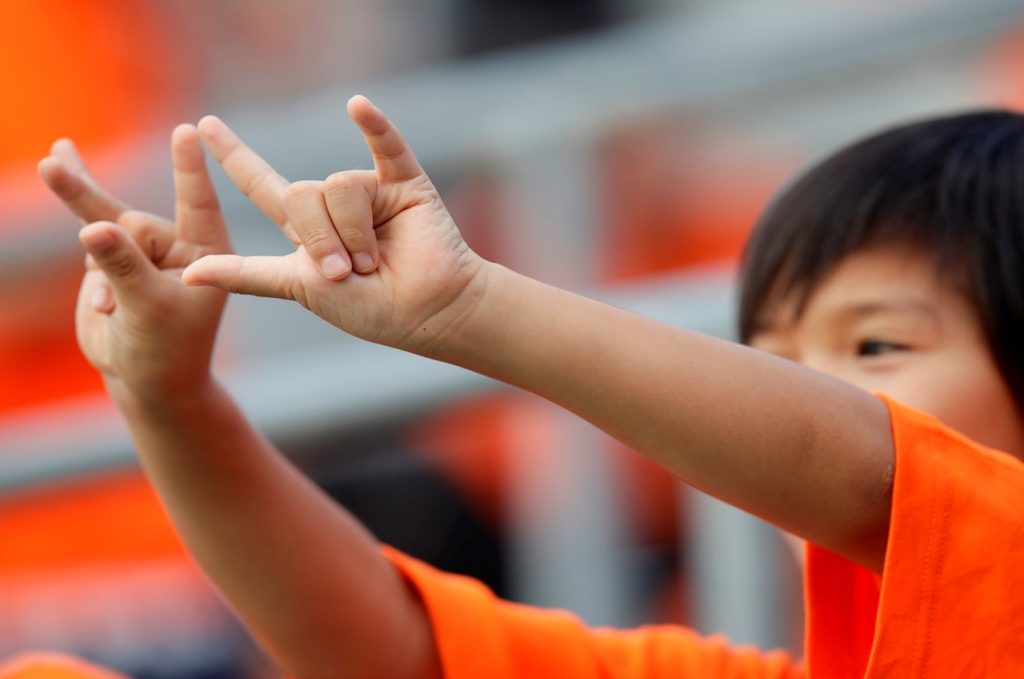
(Mainichi:Otokozawa)At first, I probably had a preconception on how to deal with people with hearing disabilities and I heard some criticisms that we were selfishly acting on our own. There weren’t many people with disability that was involved in the project. That’s when the chairman of the Saitama City Association of the deaf and I heard some criticisms that we were selfishly acting on our own. There weren’t many people with disability that was involved in the project. That’s when the chairman of the Saitama City Association of the deaf made some time for us and told us not to forget about them. We never had that intention and told them anybody can join and participate. That’s when they told us they just don’t want to participate but would like to work together as part of the executive committee.
From there on, the members of the association joined the executive committee and more people with deaf were joining our community which led to more people that being able to teach sign language. As a result, we are able to operate eight booths at a time and provide more opportunities for both the people with or without disabilities to interact together. The people within the association were really impressed that many people wanted to learn sign language and that moment was truly memorable for me.
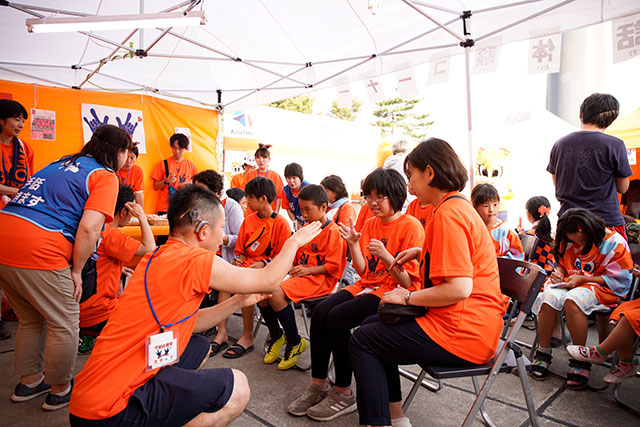
(Omiya:Ikeda)It was probably about two, three years ago. Many people with hearing disability came to our event and left saying the words “See you next year!” Those words really left an impression on me. It made me realize about how much heart the participants put into this event and the importance of setting a place for people to come and support.
(Omiya:Itaya)Even though my time being a part of the “Support your club with sign language day” is still in the early stages, the executive committee meetings are the most memorable time for me. Besides from the actual event, there are many people that are involved with the club in preparation for this day. As I get to know that, it made me realize it’s an organization that has continuously put their effort into this. Each members of the executive committee have their own opinions and thoughts into participating which leads to a lot of energy within the group.
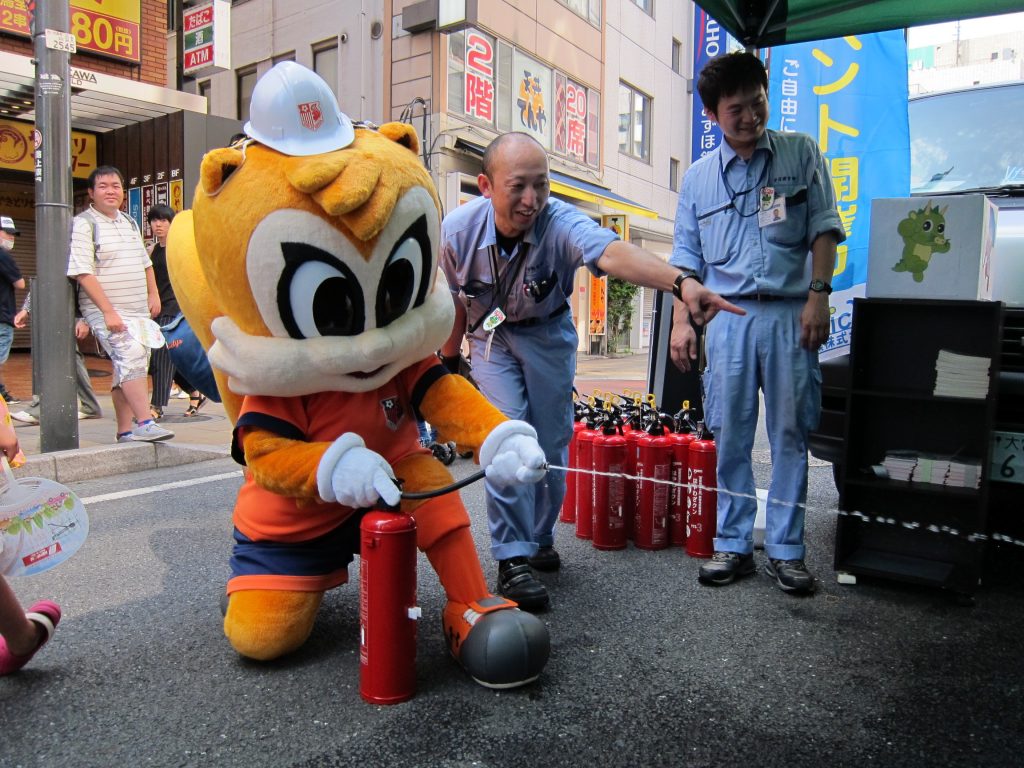
(Mainichi:Otokozawa)There are about 60 executive committee members and 20 supporting companies, but they do not just support by funding and actually participate in the projects. After our activities are done each year, we have an ending party but it’s not all about celebration and we spend some time to reflect and try to come up with improvement for next year. The continuation of that spirit brings us to where we are now.
Developing people that earns trust
―There were times when the event was discontinued, but why have the company decide to being a part again?
(Mainichi:Otokozawa)In 2010, then president Tabei (Isao) suddenly mentioned, “We’re bringing back the support your club with sign language day! We have 120 seats ready.” I was confused at first but found out that the club proposed for the opportunity to be a presenting partner for a game and we replied that our hope was to do the “Support your club with sign language day” rather than being a presenting partner for the game. That’s how much heart we had toward sign language cheering.
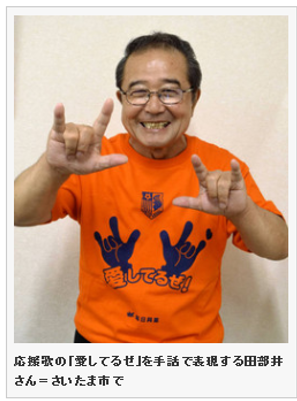
―How tough was the decision?
(Mainichi:Tabei)In Mainichi Kogyo, the business creed is “People develops trust, trust builds the business, business contributes to the growth of the community.” We operate daily being thankful to the people in the community that helps us grow and to become a group of individuals that can gain trust, we are putting our efforts toward human development on a daily basis.
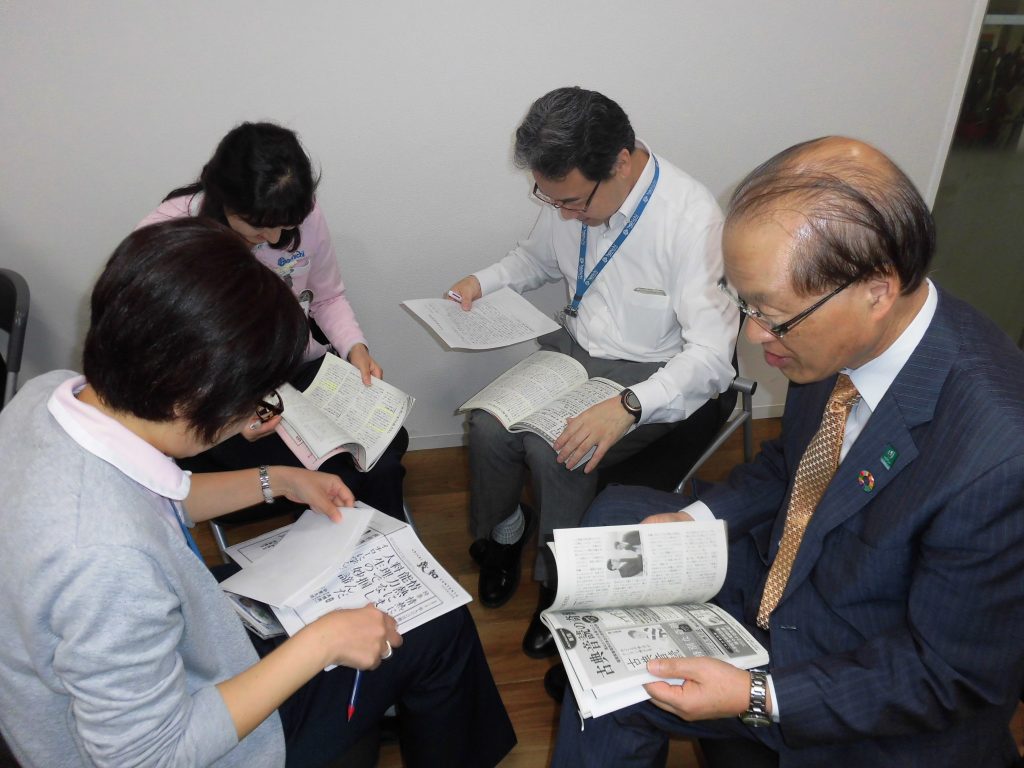
We are involved with many projects but what we value for each is for our employees to participate and sweat together. By working together with the people with disabilities, there are so much things we can learn from them. The other day I was able to see my subordinates facilitating the executive committee meeting and felt really proud as I was able to see their growth and show a different side of themselves than usual as they were outspoken by expressing what they believe in.
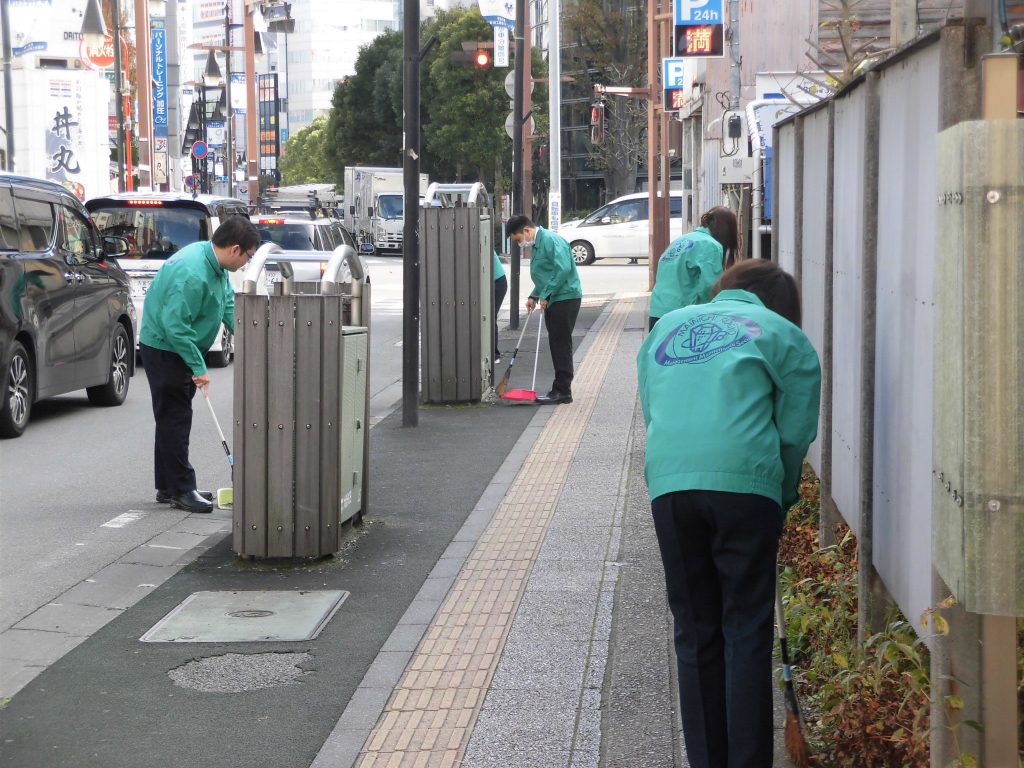
(Otokozawa)Even the government has an impression on what Mainichi Kogyo represents now. It makes us realize what kind of event “Support your club with Sign Language” means for the prefectural office as well. We are gaining trust after continuing this for ten years. As we have 60 people involved in the executive committee, each person brings something to the table, and we are able to cooperate together to provide more than this event.
Don’t Say No
―What do you value in being part of this project?
(Mainichi:Tabei)We try not to become selfish. The executive committee was constructed with mainly abled individuals, but now we have people with hearing disabilities and many that brings different perspectives to the group. The club is also assisting us to coordinate that.
(Omiya:Ikeda)In this structure of an executive committee, we have representatives from about 60 organizations and 200 to 300 volunteers, so our job is to decide on how to materialize the suggestions. Upon operating on a game day, there are many restrictions in place, but even if we cannot materialize, we try to come up with alternatives and find a solution.
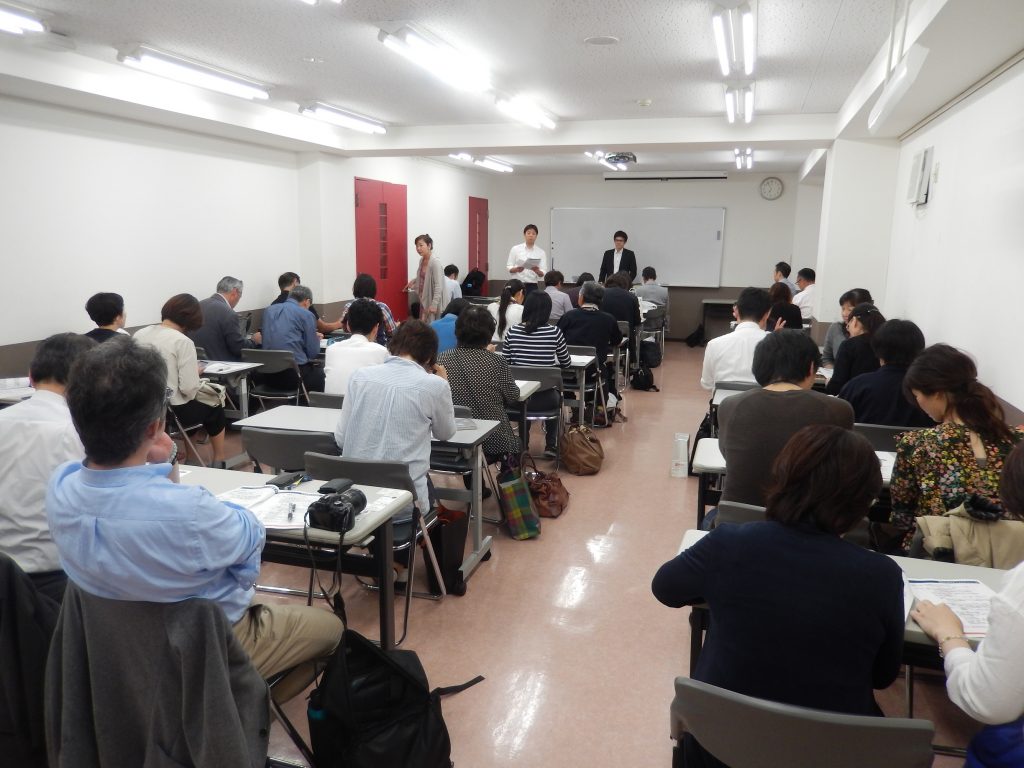
(Mainichi:Otokozawa)Don’t say no. We try to have a mentality, where we can make things done. Even if people are eager to do something, if somebody rejects them from the start that can lower their motivations.
(Omiya:Ikeda)Our intention is to 120% be the people behind the scenes. What makes this possible to continue is to have people that needs to be representing to shine. Also, we value on how things are said and the atmosphere that’s created from it, even when we don’t say NO. It’s very important to read into how people answer. There may be different meaning within answers like, “Yes, we may be able to it.” Also, it’s important to read into whether they’re answering with a YES with the understanding of the involvement and the restrictions that may be associated with a club’s operation. To get a sense of how committed they are become really important.
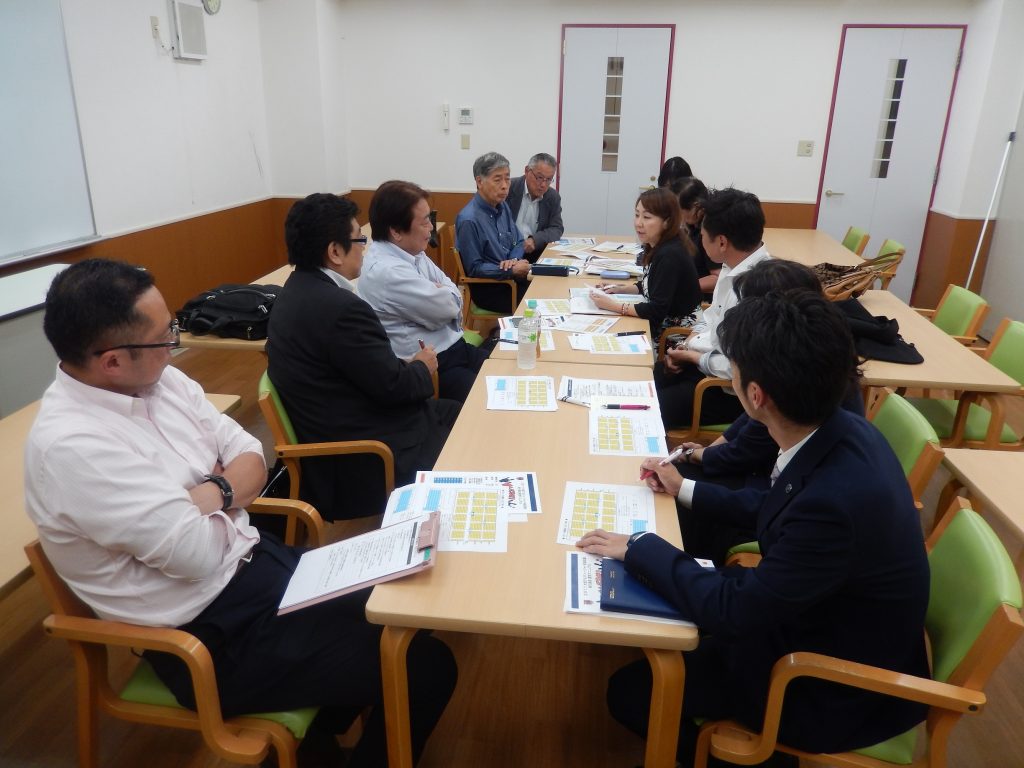
―How difficult was it to get consent within the club?
(Omiya:Ikeda)To get everyone on the same page within the club including the president is important. Before our annual year end party, we each get some opportunity to present our projects and I took the time to talk about our history going back to 2006, especially for our new staff. There may be things I need to take control, but as the project becomes bigger, there needs to be many decisions made on the spot and for all the inquiries to be directed to an individual is not a good thing.
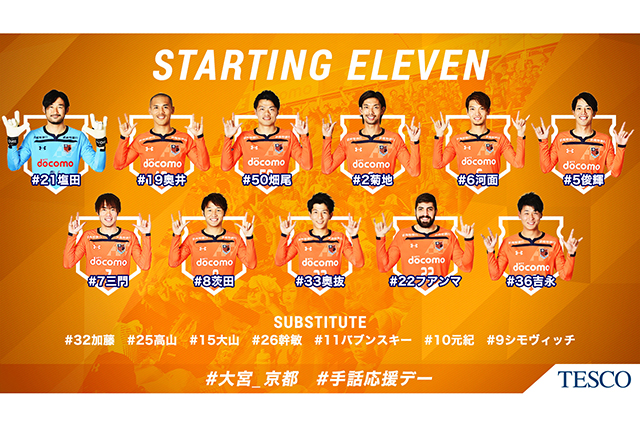
(Omiya:Itaya)Although I happened to represent our club in the executive committee meetings, I feel the ideal situation is where anybody from our club can be that person. Having this thought, I brought all four of our hometown group members to our season’s first executive meeting. It’s not just about what they gain from the actual event, but for them to realize the effort in place and the meetings that are in place to makes things happen, was in my mind going to be very valuable for them.
(Omiya:Ikeda)Every time we work on this project, there are always a new finding. For example, we found out how difficult it is to order from a concession stand. People with disabilities needs to have an environment where they can point at what they want. The people with hearing disabilities also cannot hear the voices of the security guards when they are trying to get attention.We even cannot greet them in without the support from the operational side. We cannot make this event happen without the support of our supporters. For instance, the number of chants need to be customized a bit, so there are more opportunities for people with hearing disabilities to be involved. It’s important to have people in place to develop the communication between the chant leader of the supporters and the club itself. There are type of things we emphasize every time, but all the effort results in joy at the end.
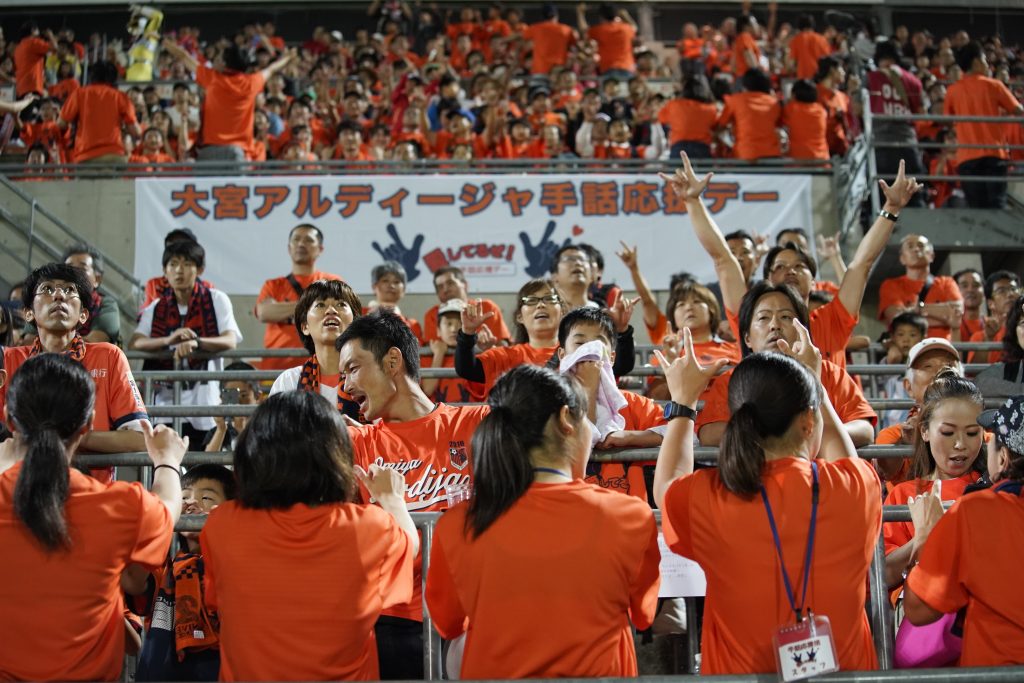
―Does it have some effect on the players?
(Omiya:Ikeda)Yes. When it’s the time of the year when we make the visit to “Omiya Rou Gakuen” to get sign language cheering t-shirts autographed, they realize what time of the year it is. Even though our players may be different from year to year, the baton gets passed down to the next generation. Our players in the academy joins us and for those players that have already experienced to be part of the top team, it creates a new history. The article written about Oyama shows an example on what players are thinking.
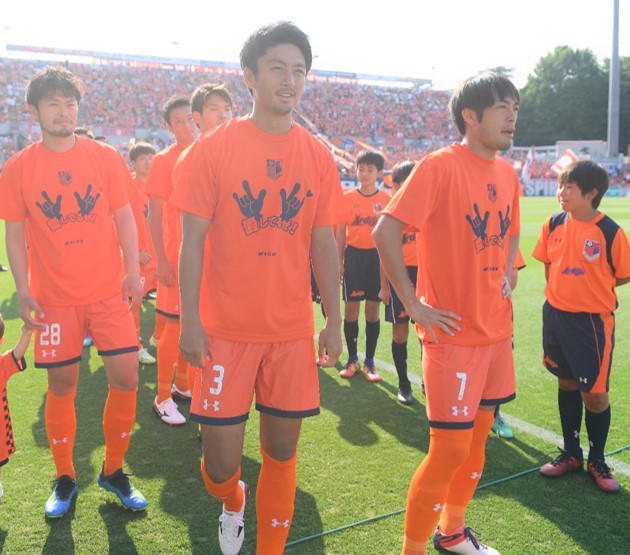
Daily scene we would like to create
―Can you talk about what you would like to accomplish in the future.
(Otokozawa)Even now, it’s not only the people with hearing disability, but there are about 300 kids with mental disability that joins us too. There are also kids from orphanage that comes as well. People with different characteristics comes together. We are all able to mingle together, disabled or not. At first, we emphasized, “We Are Orange,” associated with our team color. However, from the previous event we tried to involve the opposing team and try to expand by cheering with the sign language, “I Love You.”
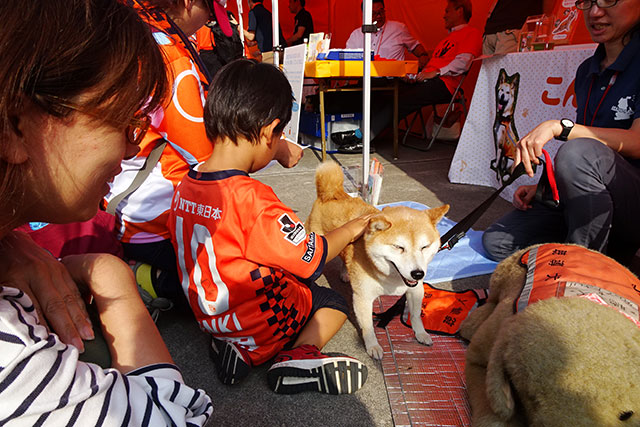
(Tabei)It would be great if it’s not just about the actual day itself, but for people to communicate with sign language when they see their neighbors in the stands with hearing disabilities. I would hope to see people understand each other more and it would be great to see that type of action from individuals daily.
Also, we are thinking about our next development after we work on facility management. We were able to find out the difficulties that occur in shelters when a natural disaster hit. From the relationship we were able to build with the members here, we would hope to help lower the burden for the people with disabilities when they need to spend time at shelters. We would like to be involved in creating those facilities and create a more generous community and society.
(Ikeda)From a club perspective, we want to be behind the scenes and put our efforts into sending the message out. We don’t want this to become something that is known only to a specific group of people and want this to reach to individuals who doesn’t even know J League. It’s not about receiving the award, but we want this to spread. It would be nice if we can conduct this in the main matches of the league.
(Itaya)Social Cooperation cannot be done singlehandedly. There are players visiting the Omiya Rou Gakuen and also the Saitama Prefecture mental disability football tournament. We hope that the dots connect and draw out a line eventually. Our hope in the future is for the Inclusive Football Federation to become a hub and for us to be involved in the inclusive football events as well. There are talks about starting a new project utilizing technology. As more ideas are brought up, our resources just within our club would not be enough. We would be happy if more and more people become involved.
*******************
What is the secret for a project like this to continue for number of years. That was the question I had in mind when starting the interview.
People that are involved all took this as its own initiative and had their own thoughts going into this. From hearing the stories, I was able to get the feel that Mainichi Kogyo and the club consciously took their efforts in creating that type of environment for the people involved.
SHAREN is an abbreviation for social cooperation. However, the word cooperation is not as easy as it looks in kanji characters. As people decides to cooperate and more and more people takes part it becomes harder to control. There are times when I get frustrated in organizing. It makes me realize how important it is for the people in charge to handle the situation.
For a company that have the financial power, it’s not out of the question to think they may feel enough just providing the money or wanting to become the sole partnering company to increase their brand value. However, that’s not the case with this “Support your club with sign language day”. What is important is to have an open mind to welcome people and to work towards being on the same page in a thoughtful matter. At the end it’s all about having the experience together.
To accomplish the hope of people involved, our stance as a football club is always thinking about “how can we make it happen.” Never be satisfied and always thinking to grow. Even for the things that didn’t go well, make that a new finding and think about how we can improve. If we continue to do that there will be activities that derives from this in different areas.
When hearing about this project it gives you courage. It gives you a feeling that you want to be involved. You want to introduce people to see what that can lead to. It makes you want to suggest “Can this be possible?” We will probably be able to see a new shape in the upcoming years.
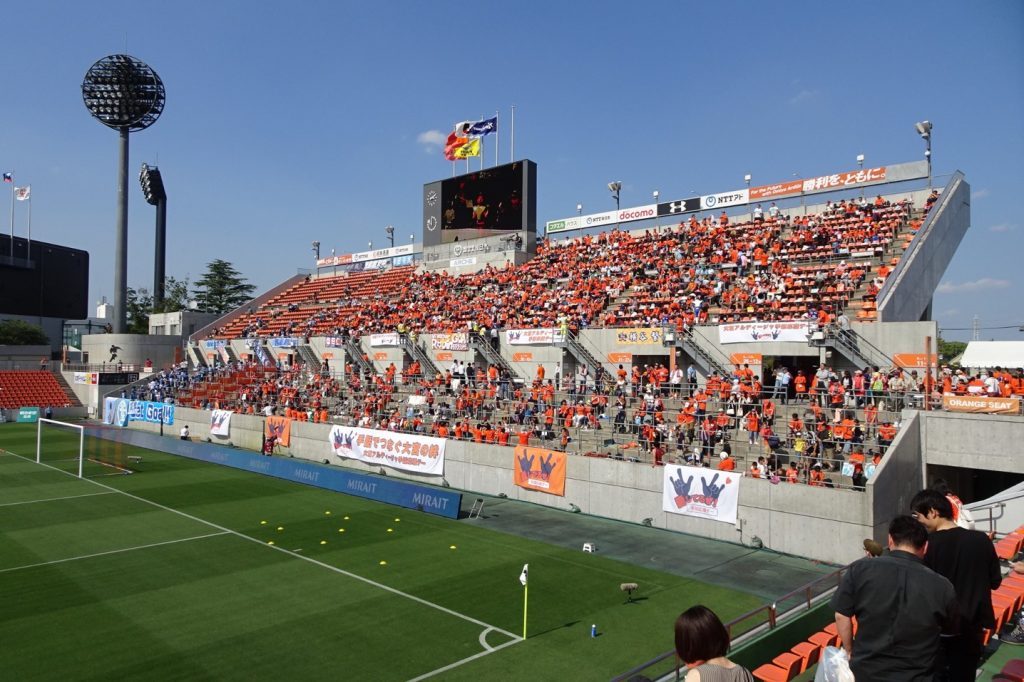
It may not be too far from the days when we will able to see people with or without disabilities all mingling, supporting and learning from each other in every stadium throughout Japan. So where should I start?
